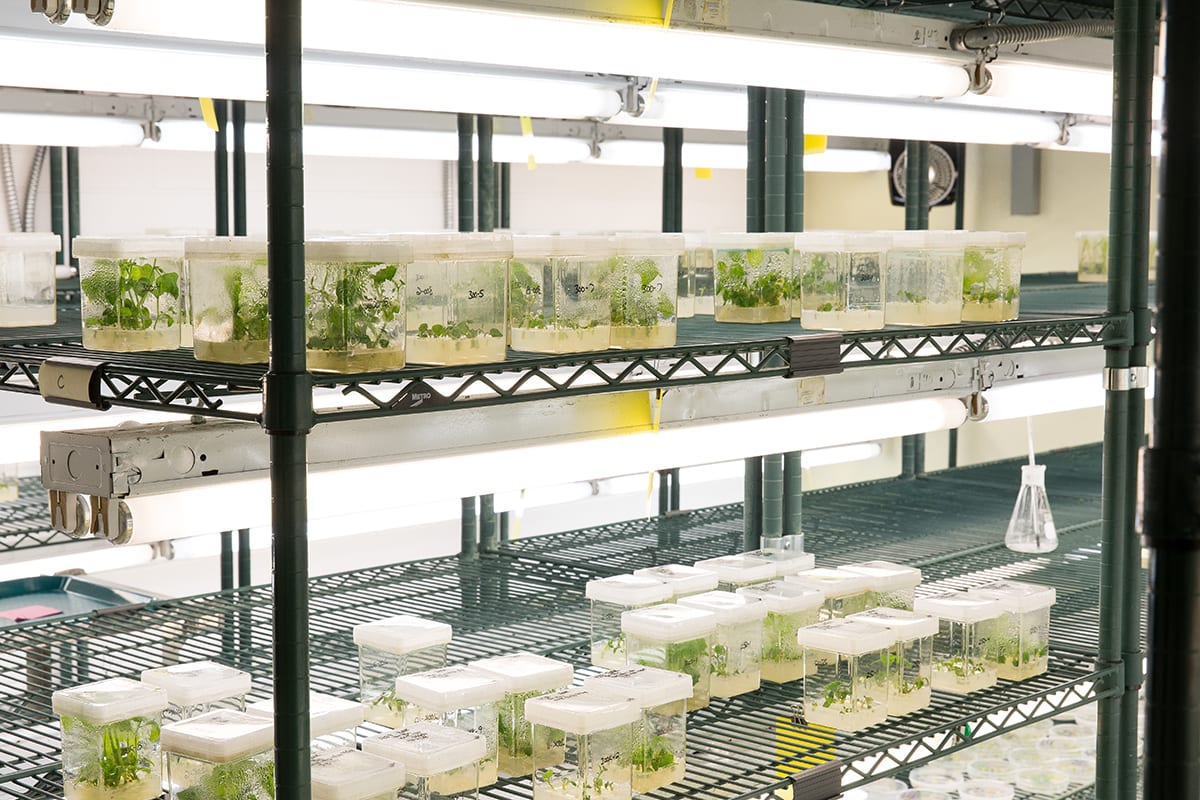Center for Plant Biotechnology Research
The Boyce Thompson Institute (BTI) Center for Plant Biotechnology Research (CPBR) was established to support projects at BTI that utilize genetic engineering and plant cell culture. The center is set up to provide plant transformations on a fee-based service for all BTI researchers as well as external users. Center personnel are experienced at Agrobacterium tumefaciens-mediated transformation of tomato and related species, potato, Nicotiana benthamiana, Medicago truncatula, alfalfa, setaria, and Brachypodium distachyon.

Guidelines for using plant transformation services
Overview
- The Boyce Thompson Institute Center for Plant Biotechnology Research provides Agrobacterium tumefaciens–mediated transformation of the plant species listed in the Species and Fees table. Transformation requests will be performed in the order they are received.
- If there are no negative effects on plant regeneration as a result of expression or knockout of the gene of interest, then the expected recovery per experiment is 5 – 10 independent transgenic lines.
- We root putative transgenic lines on selection medium. Rooted plants are moved forward as independent lines. We do not do PCR analysis as part of this work.
- Transgenic lines will be provided as rooted plants in test tubes.
- If you are submitting a transformation request for the first time or have questions regarding this guideline, please contact Qingzhen Jiang for more information.
Items required from the person who placed the request:
- Complete one transformation request form for each construct. Please submit the online request here.
- Send at least 5 ul of plasmid DNA in water at a concentration of 50 – 200 ng/ul
- Integrity of the construct(s) needs to be verified.
- Provide FedEx account # to cover the cost of shipping your transgenic lines.
- Soon after placing a request, apply for an interstate movement permit (BRS Notification) for genetically engineered plants.
-
- Select “ePermits” to start the process of acquiring an interstate movement permit (BRS Notification) under “Biotechnology Permits”
- Here is another link with helpful information for applying for an interstate movement of genetically engineered material.
- After you receive the permit, provide permit documentation (application and interstate movement permit/acknowledgment letter) in pdf format to Qingzhen Jiang.
Please acknowledge the BTI Center for Plant Biotechnology Research in publications that result from work based on transgenic lines we provided. The url for the Boyce Thompson Institute is: btiscience.org
Please note:
As we all know, research does not always go according to plan. Every effort will be made to recover transgenic lines, however, if unforeseen obstacles arise, your request might be delayed or not be completed with delivery of transgenic lines. Based on our experience, these obstacles might include the following: a gene of interest that results in lethality or affects plant development, seeds that contain a contaminant that is difficult to eradicate, a construct containing a selectable marker gene that is not efficiently expressed due to cloning errors or the promoter. Often times, it is well into a transformation experiment before it can be determined there is a problem, which could be after a significant amount of time and effort have already been invested. To defray the expenses of this effort and any troubleshooting necessary to determine the problem, 25 – 80% of the per-construct fee will be charged depending upon the effort (labor and supplies) invested.
Species and fees (2025)
|
Species |
Genotype |
Selection |
Fees |
|
|
|
|
|
Campus |
Off-campus |
|
Tomato |
M82, MoneyMaker, RG-PtoR, LA1589, Alisa Craig |
Kanamycin |
1250 |
1910 |
|
S. pimpinellifolium |
|
Kanamycin |
1250 |
1910 |
|
S. prinophyllum |
|
|
1250 |
1910 |
|
Physalis |
ZL05 |
Kanamycin |
1250 |
1910 |
|
N. benthamiana |
|
Hygromycin |
1250 |
1890 |
|
Eggplant |
BARI |
Kanamycin |
1400 |
/ |
|
Potato |
Desiree |
Kanamycin |
1310 |
1995 |
|
Brachypodium distachyon |
Bd21-3 |
Hygromycin |
1375 |
2275 |
|
Medicago truncatula |
R108 |
Glufosinate, kanamycin |
1730 |
2600 |
|
Alfalfa |
SY4D |
Hygromycin, kanamycin, glufosinate |
1400 |
2050 |
|
Switchgrass |
NFCX01 |
Hygromycin |
1500 |
2080 |
|
Setaria |
ME034 |
Hygromycin |
1600 |
2390 |
|
Barley |
Golden Promise |
Hygromycin |
1600 |
2390 |
|
Wheat |
Fielder |
Hygromycin |
1800 |
2730 |
Contact:
Qingzhen Jiang (Facility Manager)
Boyce Thompson Institute
533 Tower Rd
Ithaca, NY 14853
Email: qj37@cornell.edu
phone: (607) 255 3770


